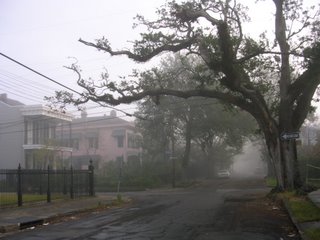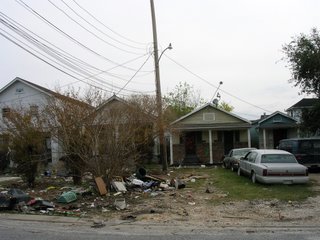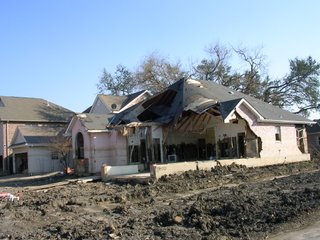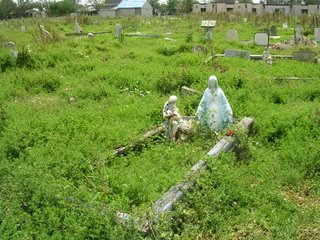
On 9/11: Memories of a home changed forever
[this blog is in response to the many blogs I have read using 9/11 to justify the war in Iraq]
My own nightmare memory is of them stricken and burning, the upper floors pluming dense, black smoke, and of the people trapped within, with the heat at their backs, leaning hard through the slim, steel, vertical windows, and not quite jumping, but rather spilling forward in measured intervals like salt from a shaker, sometimes in couples with hands clasped until the wind plucked them apart, and they wheeled the distance between life and the ground by themselves. And that day, September 11, 2001, was one of those perfect autumnal New York days, sunny and brisk, with Wedgewood skies, a hint of brine in the air from the harbor, the drowsy, husky rustle of leaves following every crease of wind. I know those autumn days in Manhattan well: They are the kind that make you want to live forever.
Unless you had seen them in life, you could never comprehend the collapse of The Twin Towers. Even for me, who had grown up in the wake of their construction, had studied late at New York University with them so close and solid, where, lit pale, they were geologic in their effect, immense sheer cliffs or icebergs rising from the dark pools of Lower Manhattan, watching them shudder down in the way that they did, their demise was totally incomprehensible.
And I am glad for all the coverage of 9/11 because it articulates my grief in a way my own words can’t. Yet there are things, very small, very particular intimacies that only a New Yorker can know, and I have often felt that in all the hugeness of the press generated during and since 9/11, these things were not covered--the things lost about the experience of the World Trade Center, about New York City.
There was, for example, the dark, gothic quiet of the financial district after hours, the night overtaking the streets in swells, the westerly tips of the Twin Towers amber, office lights punching on. There were the peregrine falcons, living in the highest vistas of the city, which, come the dusk, at The World Trade Center, they would swoop down, dropping with awesome velocity, like bullets, straight toward the ground.
We could see Manhattan from where I grew up in Queens; and the skyline had its own language, like a phrase of music, the boxy high and low buildings varying in tone and pitch, with the Twin Towers punctuating the end, as extreme as a Beethoven coda. At night, on the coldest days of winter, when the sky was clear as a film of glass, the Twin Towers, even from an eastern distance of miles, stole the eye away from the more beautiful Chrysler Building or Empire State: They were two truculent, audacious statements of power, yes, but also of possibility, or rather the impossible realized, and they were so unabashedly ugly that New Yorkers were hoodwinked into loving them.
There was the terror of the wind at the top. I watched the towers being built for most of my childhood, able to see, from my neighborhood park the cranes spiking the newest floors like thorns, yet I went to the top exactly twice in my life and only once to the open air observatory. I hated it. The wind was demonic, slapping my clothes flat to my body, and I held onto my eyeglasses because I could feel the vibration of the building within my metal frames.
On 9/11, my brother stood on the roof of the building where he works and watched the towers fall, vanish into blooming, gray, smoky puffs. My friend, vacationing in the Bahamas, watched the entire floor where her satellite office was located burst into a rolling crest of bright orange flame, killing, at once, everyone she had worked with for the past 10 years. In New Orleans, my husband came home from work and woke me. I was sleeping in after teaching a late class Monday night, September 10th. I couldn’t understand why he was so agitated. A plane, small craft, were there casualties? “You don’t understand,” he said. “The World Trade Center is gone.” And he turned on the TV.
Dear Father in heaven. My God, my God, my God. My brother in-law is a New York City firefighter and when we saw his Engine company number ticker tape at the bottom of the screen as having men “missing”, I fell, literally, to the floor. I felt a flush of hysterical hatred, and in my immediate grief, I lost my lofty values: I wanted to nuke the Tora Bora into a sea of glass. My husband began frantically packing a duffle bag. He was throwing his SWAT gear into it. He took out his assault rifle and I stared at him, uncomprehending. “If my brother is in that, I’m getting up there and digging him out,” he said quietly. We had lost his sister to leukemia 24 years before and none of us had ever recovered; I thought, no, no, no. Not my brother in-law. No, no, no, no, no, no. My husband had to go back to work and I spent the afternoon in what I can only call a death watch, in wailing, banshee grief. It was the worst experience of my life, with combinations rolling through my mind: instant death, burning death, or trapped injured, but whole under all that, with no hope, small fires inching closer. No, no, no, no, no, no, no. And when finally I heard that my brother in-law lived, I was weak with joy, a terrible, shameful, selfish joy, the greatest joy of my life, joy, even after I knew that some of his friends were under that colossus of rubble, joy, even after I knew that another university instructor here in New Orleans had lost his own firefighter brother in the collapse.
But within the first week, when rationality gradually settled our high blood and we saw the tragedy play itself out, a tragedy for which we New Yorkers had absolutely no gestalt, or for people like my brother in-law, who had to work Ground Zero in the face of the loss of four close friends, we wanted something transcendent to come of 9/11. The anger that we felt, the desire for either justice or revenge was too solitary, too limited a reaction, too weak an answer to the courage and the loss we witnessed that day. So, when, in the moments, days, and months after 9/11, we saw the solidarity, not only of our nation, but of the international community as well, and felt the fraternity and empathy which made those first terrible, dark months somehow possible to bear, we realized what the legacy of 9/11 had really been: For that extraordinary time, the victims of 9/11 had united the world and shown us humanity, the way humanity is meant.
But then something else happened. September 11 became a cause for some uncertain agendas. We lost the good will of the global community. The atrocities of our war in Iraq, totally unrelated specifically to 9/11, eclipsed the nearly 3000 deaths on that day, as well as the horrific injuries, the burn victims, the dismembered and disfigured that the mass media failed to homage. Now it was our bombs killing civilians; now it was our government selling tyranny to the American public; now it was our treatment of prisoners that crossed the line into such an ugliness, it took away my breath. Why does no one understand? The terrorists win when we cease being us; when, for whatever reason, we cease being American, when we become like them.
It was for the Centennial Celebration of the Statue of Liberty that I stood, for the last time, in The World Trade Center. We couldn’t get near the water, where the fireworks were held, so we went into the WTC and found a small, elevated outdoor promenade where we still had a clear view of the sky over the Hudson River. We were alone at first, but space is not a secret that keeps well in Manhattan, and soon more and more people joined us until we were as crowded as roosting pigeons under an eave.
Then the fireworks began.
Everyone was stunned dumb. The booming resonated so deeply in my sternum that my chest throbbed and I could feel the promenade quiver beneath my feet. There were so many people pressing into every part of me, I could hardly breathe. I felt afraid. The flares were lovely, splintering across the sky, startling the night into carnival color, refulgent and bright as day. But they left behind a smoky haze and a queer, burning, sulfuric scent, and after several spectacular displays, I had had enough and told my husband I wanted to leave. So we left, entering one of the Twin Towers, and jogging through to the lobby exit and the fresh night air of the open street. For a little while we watched the celestial violence of the fireworks reflected in the glass of the various buildings around us, luminescent, cloudy explosions, like the birth of stars. Then I tilted my head back and looked up at the Twin Towers, because they commanded that every time you were in their proximity, no matter how many times you had seen them.
That was the absolute last time. I never stood at The World Trade Center again. What pain to think I could not know that not only was their loss imminent, but that our loss would continue well past that day, 9/11, that we would begin to lose sight of who and what we were, of what we always aspired to even if we fell short of that aspiration, that 9/11 did not mark a beginning, but an end…an end to being the America of the original hopes, the original dreams which created her.
Copyrighted by Angelica Kiedrowski 2003, 2004. (parts of this essay appeared in The Times Picayune, September 11, 2003.)






